Related Research Articles

A supermarket is a self-service shop offering a wide variety of food, beverages and household products, organized into sections. This kind of store is larger and has a wider selection than earlier grocery stores, but is smaller and more limited in the range of merchandise than a hypermarket or big-box market. In everyday U.S. usage, however, "grocery store" is often used to mean "supermarket".

Kimberly-Clark Corporation is an American multinational personal care corporation that produces mostly paper-based consumer products. The company manufactures sanitary paper products and surgical & medical instruments. Kimberly-Clark brand name products include Kleenex facial tissue, Kotex feminine hygiene products, Cottonelle, Scott and Andrex toilet paper, Wypall utility wipes, KimWipes scientific cleaning wipes and Huggies disposable diapers and baby wipes.
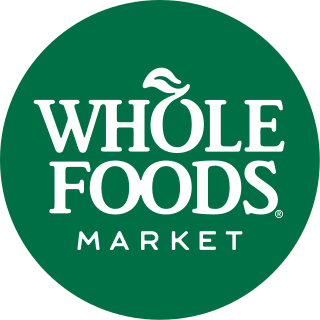
Whole Foods Market IP, Inc., a subsidiary of Amazon, is an American multinational supermarket chain headquartered in Austin, Texas, which sells products free from hydrogenated fats and artificial colors, flavors, and preservatives. A USDA Certified Organic grocer in the United States, the chain is popularly known for its organic selections. Whole Foods has 500 stores in North America and seven in the United Kingdom as of March 4, 2019.
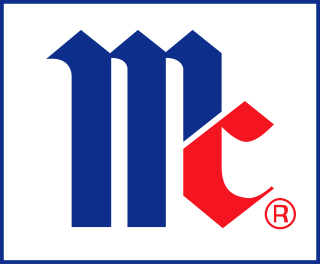
McCormick & Company, Incorporated is an American food company that manufactures, markets, and distributes spices, seasoning mixes, condiments, and other flavoring products to retail outlets, food manufacturers, and foodservice businesses.

A private label, also called a private brand or private-label brand, is a brand owned by a company, offered by that company alongside and competing with brands from other businesses. A private-label brand is almost always offered exclusively by the firm that owns it, although in rare instances the brand is licensed to another company. The term often describes products, but can also encompass services.
The Consumer Brands Association (CBA), formerly the Grocery Manufacturers Association (GMA), is a United States-wide trade association for manufacturers of consumer packaged goods (CPG).

Silk is an American brand of dairy-substitute products currently owned by Danone after it purchased WhiteWave Foods in 2016.
The Food Products Association was the principal U.S. scientific and technical trade association representing the food processing industry until 2007. FPA was headquartered in Washington, D.C., with branches in Dublin, CA, and Seattle, WA. The association emphasized governmental and regulatory affairs, scientific research, technical assistance, education, communications, and crisis management.

Festival Foods is a family owned grocery company operating stores throughout Wisconsin. It was founded as Skogen's IGA by Paul and Jane Skogen in 1946 in Onalaska, Wisconsin, and is still owned by the Skogen family. Festival's private label brands are supplied by SuperValu, with the majority under their Essential Everyday label.
Gregory James Caton was an American businessman, inventor, manufacturer, convicted felon, and promoter of various herbal products, the main one being Cansema, which Caton claimed cures skin cancer, although the U.S. Food and Drug Administration (FDA) banned it in 2003 as worthless. Caton was the founder of Alpha Omega Labs, a manufacturer of natural health care products, that currently distributes internationally from Guayaquil, Ecuador.
Palermo's Pizza is a frozen pizza manufacturer, headquartered in Milwaukee that makes a number of branded products including: Palermo's Primo Thin, Palermo's Neighborhood Pizzeria, Screamin' Sicilian, Urban Pie Pizza Co. and Connie's Pizza, as well as a number of private label products.
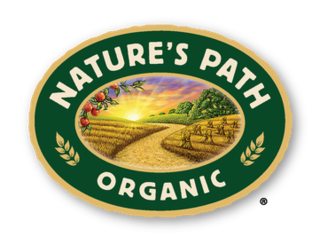
Nature's Path Foods, commonly known as Nature's Path, is a privately held, family-owned producer of certified organic foods. Originally known for its breakfast cereals, it now has a portfolio of more than 150 products. Founded in 1985 by Arran and Ratana Stephens, Nature's Path employs approximately 500 people, with manufacturing facilities in Canada and the United States and sales in more than 40 countries. All of its products are vegetarian, certified organic, and Non-GMO Project Verified. Nature's Path is a triple bottom line social enterprise, and has been recognized for incorporating the notion of sustainability into its business practices through its support of various charitable and eco-friendly initiatives. The company is regularly named one of Canada's best employers.

Proposition 37 was a California ballot measure rejected in California at the statewide election on November 6, 2012. This initiative statute would have required labeling of genetically engineered food, with some exceptions. It would have disallowed the practice of labeling genetically engineered food with the word "natural." This proposition was one of the main concerns by the organizers of the March Against Monsanto in May 2013.

Washington Initiative 522 (I-522) "concerns labeling of genetically-engineered foods" and was a 2012 initiative to the Washington State Legislature. As certified by the Washington Secretary of State, it achieved enough signatures to be forwarded to the legislature for consideration during the 2013 session. The legislature did not vote on the initiative, so I-522 advanced to the November 5, 2013 general election ballot. If passed into law by voters, I-522 would have taken effect on July 1, 2015. The initiative failed with 51% opposition.
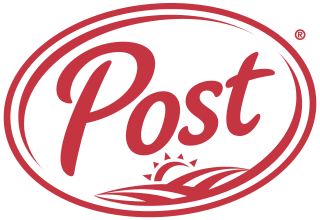
Post Holdings, Inc. is an American consumer packaged goods holding company headquartered in St Louis, Missouri with businesses operating in the center-of-the-store, refrigerated, foodservice, and food ingredient categories. It's Post Consumer Brands business manufactures, markets, and sells both branded and private label cereal products. Its Michael Foods Group business supplies value-added egg products and refrigerated potato products to the foodservice and food ingredient channels. Through its Post Refrigerated Retail business, Post offers potato, egg, sausage, and cheese refrigerated side dishes products. Post participates in the private brand food category through its investment in 8th Avenue Food & Provisions, a leading, private brand centric, consumer products holding company.
The Ohio Department of Agriculture (ODA) is the administrative department of the Ohio state government responsible for ensuring the safety of the food supply, to maintain the health of animals and plant life, to create economic opportunities for farmers, food processors and agribusinesses, and to inspect amusement park rides in the state of Ohio.
Public Law 114-216 is a federal law of the United States that regulates GMO food labeling. It was enacted on July 29, 2016 when President Obama signed then Senate Bill 764 (S.764). While the law is officially termed A bill to reauthorize and amend the National Sea Grant College Program Act, and for other purposes, it evolved over time into "the legislative vehicle for a measure concerning bioengineered food disclosure", which opponents have called the "DARK Act", an acronym for "Deny Americans the Right to Know Act".
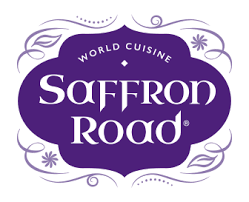
Saffron Road is an American food brand. It is a subsidiary of American Halal Company, Inc. Saffron Road manufactures clean-label frozen foods, meal pouches, simmer sauces, family sized meals, and healthy snacks that are halal certified, all of which are made with ingredients from global cuisines. Saffron Road products are sold through 25,000 retail locations across the nation such as Whole Foods Market, Kroger, Safeway Inc., Giant Food Stores, Publix, Sprouts Farmers Market and H-E-B and Walmart, where it is the top natural protein-based entree.
References
- ↑ "Charles Glen King Papers". National Library of Medicine. Retrieved 4 February 2021.
- 1 2 3 Monte, Tom (1979). "Grocery Manufacturers of America: The food industry's power broker". Nutrition Action. 5 (8): 3–7.
- ↑ "Grocery Manufacturers of America, Inc., a Delawarecorporation, Plaintiff-appellee Cross-appellant, v. Joseph Gerace, Commissioner, New York Department Ofagriculture and Markets, and the New Yorkdepartment of Agriculture and Markets,defendants-appellants Cross-appellees,john R. Block, as Secretary of Agriculture of the Unitedstates and the Department of Agriculture of the Unitedstates, Margaret M. Heckler, as Secretary of Health Andhuman Services of the United States, and the Department Ofhealth and Human Services of the United States, Additionaldefendants on Counterclaim-appellees, 755 F.2d 993 (2d Cir. 1985)".
- ↑ "PAC Profile: Consumer Brands Assn".
- ↑ Wilkins (1979). "GROCERY MANUFACTURERS OF AMERICA, INC. & others vs. DEPARTMENT OF PUBLIC HEALTH & another". Massachusetts Supreme Judicial Court. 379 Mass. 70.
- ↑ "Kimberly-Clark CEO Thomas J. Falk Elected to the Board of the Grocery Manufacturers of America". KCWW. Kimberly-Clark. 25 January 2005.
- ↑ "GMA Changes Name, Releases Logistics Benchmark Study". Progressive Grocer. 13 July 2005.
- ↑ "ABOUT THE CONSUMER BRANDS ASSOCIATION Powering every day - Our History". Consumer Brands Association. Retrieved 4 February 2021.
- ↑ "Sen. Pat Roberts proposes GMO labeling bill, as July 1 deadline to label products in Vermont looms".
- ↑ "ABOUT THE CONSUMER BRANDS ASSOCIATION Powering every day - Our History". Consumer Brands Association. Retrieved 4 February 2021.
- ↑ "Grocery Manufacturers of America Inc - Company Profile and News" . Retrieved 4 February 2021.